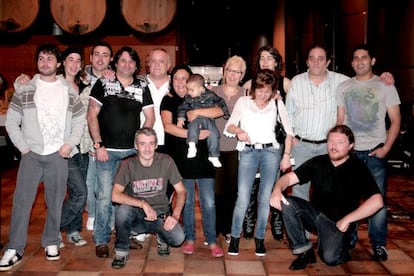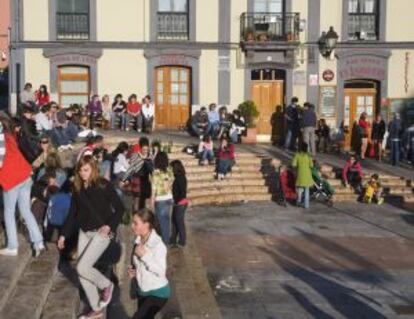The poisoner in the kitchen
Assistant chef allegedly contaminated co-workers' food and drink over six-year period

For the last six years, just about everybody who has worked at El Lavaderu, a restaurant and cider house, or sidrería, in the northern seaside resort of Gijón, has suffered health problems, with one employee having to leave his job, later dying of an unexplained illness. The symptoms were always the same: rashes, breathing problems, and vomiting, but never affected customers. But it never occurred to the owners of the restaurant, Tino Comerón and his wife Chelo Toyos, that they might have a poisoner on the premises.
The couple opened El Lavaderu 14 years ago. It's typical of the many sidrerías to be found in the region, with stone walls, wooden beams, large wooden tables, and hefty wooden barrels.
In 2004, with business booming, Tino and Chelo decided they needed an assistant chef. They hired Andrés Avelino Fernández, a family acquaintance of Chelo, who had run a bar before and owned a tiny store in a neighboring town. "He was a nice man, always willing to do favors," Chelo says.
He broke out in a rash, had trouble breathing, and suffered vomiting spells
Andrés also came on the recommendation of a long-standing employee, Eva, who worked in the kitchen.
"They were old friends," says waiter Gustavo Vera, 35.
His co-worker Benjamín Menéndez agreed: "They went out for a drink, dinner... always together."
Vity Mancha who worked there for three years as extra help said: "They went on holiday abroad... together. A Mediterranean cruise, Paris, Vienna, Thailand."
The first problems appeared in 2006. Alberto, the head chef, who had got on well with Andrés, became ill. He broke out in a rash, had trouble breathing, and suffered vomiting spells. His condition worsened, but despite repeated visits to his doctor, no cause could be found. He ended up taking a leave of absence and returning to his home town.
After that, others began to have similar symptoms: kitchen staff, waiters, and the owners. "We thought it was an allergy," Chelo says.
Almost everybody fell ill over the following years. In May 2011, Andrés and Juan Gil, the chef at the time, were working in the kitchen when Juan collapsed to the floor and died, seemingly the victim of a heart attack. Employees at the restaurant say that at the funeral, Andrés appeared distraught.
In January 2012, Tino and Chelo sold the restaurant. Both had been ill for long periods, and Tino had suffered a heart attack. Neither has fully recovered. Andrés stayed on. Eight months later the new owner, Juan Luis Alfonso, took sick. Having been told the story of the long-running illnesses by the former owners, he contacted the police, giving them the names of 14 people he knew had been affected. Later the names of former employees were added to the list, bringing the total to 21.
He says he began to wonder whether the origin of the problem might not lie within the restaurant when he realized that people soon recovered from the itching, dizziness and vomiting when they took time off. When they returned, so did the symptoms.

He also told the police that some of the waiters had become suspicious of the assistant chef. One thing they all had in common was that Andrés prepared a sandwich for them each day, reportedly making sure they ate it.
Staff also realized that the symptoms began when they drank anything alcoholic, whether a sip of cider or mug of beer.
There was something about the timing, too. It was not simply when they drank alcohol that they felt ill, but when they drank it after eating something Andres had given them. The police asked them to keep an eye on him and make sure that no one, neither customers nor colleagues, ate or drank anything he prepared.
On one occasion, a co-worker saw Andrés take out a little vial of liquid and pour it into a cup of coffee he was making for someone. Juan Luis Alfonso provided it to the police for testing.
The result left no doubt that it contained a dangerous substance -- calcium cyanamide, a drug used in the treatment of alcoholism. A clear liquid that has no flavor, this medication can cause drowsiness, dizziness, vomiting, skin irritation, tachycardia, hypertension, multiple organ failure, and even death.
It turned out that Andrés was under treatment for alcoholism. He easily obtained the medicine from a pharmacy near his place of work. Something he did often and in large quantities, according to the police investigation.
He is now in jail awaiting trial on charges of the attempted homicide of 14 people, a figure that will likely increase.
He has been declared sane, but no motive for the alleged crimes has been given. Police say that Andrés may have borne a grudge against his employees, and that there were frequent arguments in the kitchen.
All the victims say they regarded Andrés as a friend, spending time with him outside work. Eva, the only person who worked in the restaurant not to have been affected by the alleged poisonings, continues to work in the restaurant's kitchen, but has refused to talk about what happened.
Police say they will open an investigation into the death of the chef.
Tu suscripción se está usando en otro dispositivo
¿Quieres añadir otro usuario a tu suscripción?
Si continúas leyendo en este dispositivo, no se podrá leer en el otro.
FlechaTu suscripción se está usando en otro dispositivo y solo puedes acceder a EL PAÍS desde un dispositivo a la vez.
Si quieres compartir tu cuenta, cambia tu suscripción a la modalidad Premium, así podrás añadir otro usuario. Cada uno accederá con su propia cuenta de email, lo que os permitirá personalizar vuestra experiencia en EL PAÍS.
¿Tienes una suscripción de empresa? Accede aquí para contratar más cuentas.
En el caso de no saber quién está usando tu cuenta, te recomendamos cambiar tu contraseña aquí.
Si decides continuar compartiendo tu cuenta, este mensaje se mostrará en tu dispositivo y en el de la otra persona que está usando tu cuenta de forma indefinida, afectando a tu experiencia de lectura. Puedes consultar aquí los términos y condiciones de la suscripción digital.








































